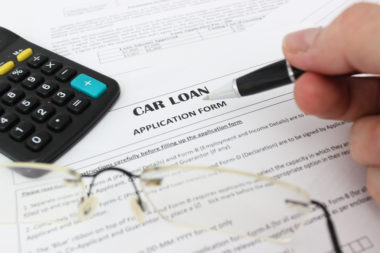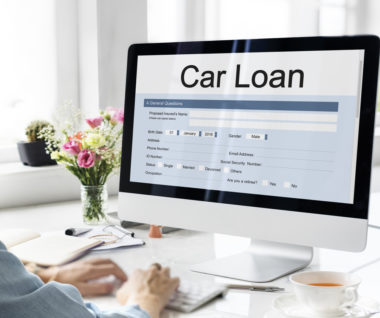Whether you’re a brand new driver in search of your first set of wheels or a seasoned veteran moving on to your second or third vehicle, before you get far into the process you’re going to face the daunting question of how to get a car loan.
Table of Contents
Figure Out Your Budget
When it comes to applying for a car loan, it’s important to start by figuring out your budget.
This may seem fairly easy, and it’s tempting to simply make an educated guess and then look for an option at that price range. If you try to simply come up with numbers on the fly in the middle of a dealership while a pushy salesman is breathing down your neck, though, you’re almost certainly going to regret it in the long run.
Before you start shopping, it’s highly recommended that you take the time to carefully consider what you can afford.
When it comes to car budgets, in particular, a good rule to keep in mind is that the sum of your car expenses should typically fall somewhere between 10% and 15% of your total monthly budget. It’s also typically recommended that you don’t take out a car loan with terms that last longer than 48 months. Before you start looking for a short-term loan, though, remember that we’re talking about all of your car expenses. These include:
- The car payment.
- Car maintenance — think oil changes, breaks, and fluids.
- Car repairs — if it’s a new car, this is often minimal due to the warranty, although when it comes to used cars it should be a significant consideration.
- Car insurance — this can be particularly high for new cars.
Having a solid budget in place is a good way to avoid getting stuck with payments that you can’t afford.
Check Your Credit
Once you have a budget in place, there’s one more thing to do: check your credit score. Remember, you’re going to be asking for a loan, and your credit score is going to be a major determining factor for how much money you’re qualified to borrow in the first place.
According to the FICO scoring model, a good credit score is typically somewhere between 670 and 799. However, it’s also encouraging to note that one out of every five car loans is given to those with scores under 600.
The major factor to consider with all of this is interest rates. As a rule of thumb, the lower your score, the higher your interest rate will be, and the higher the interest rate, the more it’s going to cost you in both monthly payments as well as the overall cost of your car.
This is because your score is a reflection of your responsibility and trustworthiness as a borrower. The more of a risk it is to lend you money, the more you’re going to have to pay a lender to borrow their money.
If you find that your score is less than desirable, some ways to increase your credit score include:
- Having several different, healthy lines of credit available.
- Making sure that you’re utilizing less than 30% of your available credit — you can do this quickly by paying off credit cards.
- Avoiding any late payments or fees.
Shop Around for Lenders
When it comes to taking out a loan for a car, it’s important to take some time to understand how to get approved for a car loan depending on each lender being considered. After all, not all loans — nor the lenders that offer them — are created equal. Here are some of the primary options:
- Getting a loan through your bank: This provides security and can typically be easily integrated with your existing accounts. However, the rates aren’t always the lowest available.
- Getting a loan through a credit union: This can help you get good rates. However, while many lenders have pre-existing relationships with dealers designed to speed up the loan application process, credit unions typically do not. This means it can often take a bit longer to finish the loan process.
- Getting a loan through an independent lender: You can always get the money from an independent lender, such as a friend, family member, or private lender. This is typically quick, and in the case of a friend or family member, you can have some input on the terms. Keep in mind, though, that private lenders may charge higher interest rates and hidden fees, and they might even try to scam you if you’re not careful.
- Getting a loan through a dealership. This is convenient and can often yield the lowest rates or get you a loan even when your credit is bad. However, you’re at the mercy of what they offer and may end up with a loan from a bank that you wouldn’t necessarily have chosen on your own.
Get Pre-Approved
Once you have your budget, credit score, and lender all in order, you should consider getting pre-approved for a car loan.
Auto loan pre-approval is simply getting your foot in the door, so to speak, with a lender. You’ll go through the approval process, which includes an application and credit check, before you actually need the loan. You can typically get a document saying the amount you’re pre-approved for, which can help in multiple ways when you’re shopping, as it can:
- Lock you in at a good rate.
- Provide a solid number that you know you can work with.
- Give you a negotiating tool.
Find the Car You Want
After you get a car loan sorted out, it’s time to get a car. If you’ve done your homework beforehand, you’ll have a solid idea of how much you can spend. Remember, you don’t have to use up all of the money you’re pre-approved for, either. If you find a car that costs less money, you can always borrow less from the bank without a penalty.
Once you find your dream car, use your pre-approval to streamline the process and, before you know it, you’ll have your new car purchased and your loan set up. The entire car buying experience will be in the rearview mirror.
Image Source: https://depositphotos.com/





